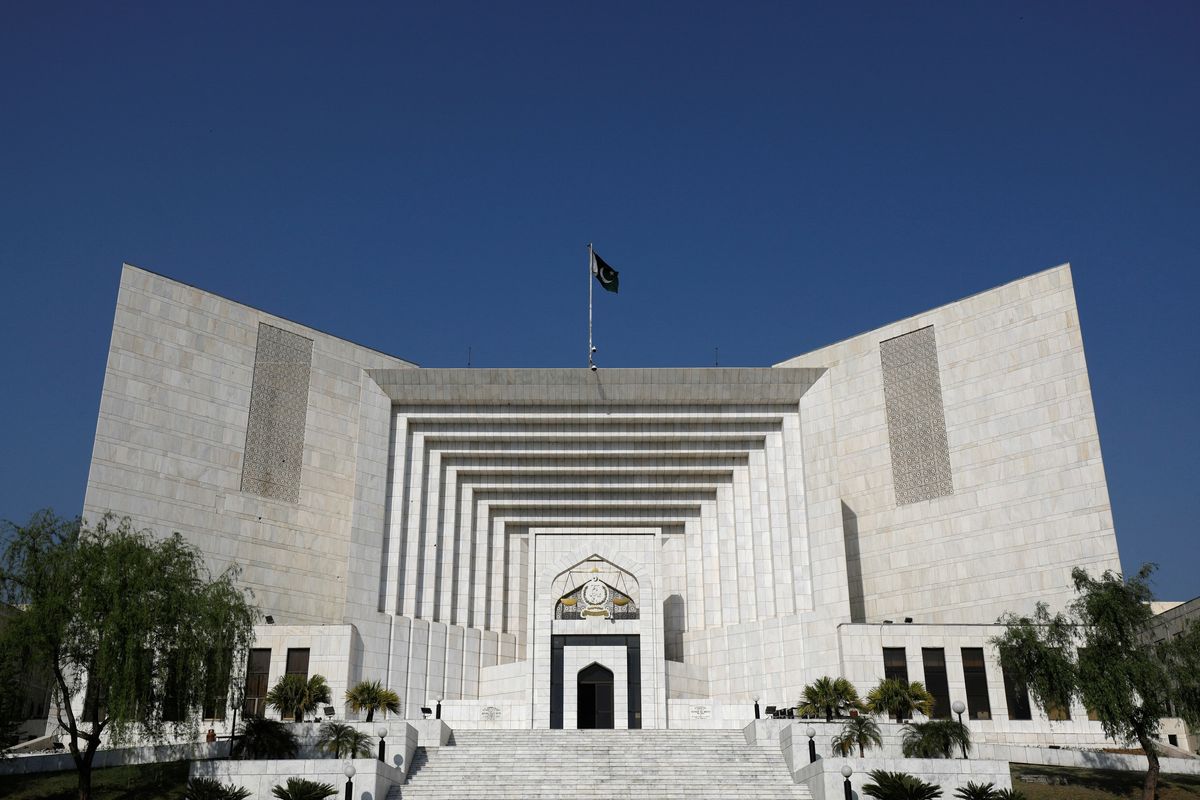Pakistan's top court weighs constitutional roles of president, others in judges transfer case
Supreme Court also addressed the new Islamabad High Court Rules 2025, which petitioners claim lacked full court approval and official gazette notification
Ali Hamza
Correspondent
Ali; a journalist with 3 years of experience, working in Newspaper. Worked in Field, covered Big Legal Constitutional and Political Events in Pakistan since 2022. Graduate of DePaul University, Chicago.

The Supreme Court of Pakistan on Monday resumed hearing a petition challenging the recent transfers and appointments of judges to the Islamabad High Court (IHC), as the bench examined the constitutional roles of the president, prime minister, and judicial commission in the transfer process.
This legal battle stems from a recent round of judicial transfers to the IHC that altered the existing seniority order. The matter came to the fore after the Ministry of Law and Justice issued a notification on February 1, transferring three judges — Justice Sardar Mohammad Sarfraz Dogar, Justice Khadim Hussain Soomro, and Justice Muhammad Asif — from their respective high courts to the IHC.
Justice Dogar was transferred from the Lahore High Court, Justice Soomro from the Sindh High Court, and Justice Asif from the Balochistan High Court. These appointments sparked debate over how their seniority would be determined within the IHC.
In response, five sitting IHC judges — Justice Mohsin Akhtar Kayani, Justice Tariq Mehmood Jahangiri, Justice Babar Sattar, Justice Sardar Ejaz Ishaq Khan, and Justice Saman Rafat Imtiaz — raised formal objections. They argued that under the Constitution, a judge transferred to a different high court must take a fresh oath, which should affect their seniority standing.
As a form of protest, the five judges declined to attend Justice Dogar’s oath-taking ceremony as acting IHC chief justice. In an unusual move, President Asif Ali Zardari personally administered the oath, bypassing the traditional practice of a senior judge performing the duty. The five judges later petitioned the Supreme Court, seeking legal clarity on whether such transfers should reset seniority and whether due process was followed.
A five-member constitutional bench, headed by Justice Muhammad Ali Mazhar, is currently examining the legal and constitutional dimensions of the issue, with arguments being presented by counsel and legal experts.
The hearing
During Monday’s proceedings, Barrister Salahuddin, representing the petitioning judges, argued that the current policy of transferring judges violates basic principles of justice and fairness. He emphasized that Article 200 of the Constitution should be read in the context of its subsection (3), and noted that — unlike in the civil service where transfers impact seniority — the judiciary has no such precedent.
He contended that transferring judges without their consent undermines judicial integrity and fairness. While civil service appointments may involve deputations and departmental shifts that do not diminish seniority, Salahuddin asserted that the judiciary requires more stringent safeguards to preserve seniority and uphold judicial independence.
He also compared Pakistan’s approach to India’s, noting that while judges in India cannot refuse transfers, Pakistani judges have a constitutional right to object -- a distinction he said must be preserved.
Questions on presidential discretion
Justice Muhammad Ali Mazhar posed a series of pointed questions during the hearing. He observed that there are established court rulings affirming that a judge’s seniority is determined from the date of appointment. He further asked: “If a judge is transferred to another high court, what becomes of their original seniority?”
The bench also discussed the constitutional roles of the president, prime minister, and judicial commission in the transfer process. Salahuddin argued that it must be determined whether the president is bound to act solely on the PM’s advice or if he must exercise independent judgment.
Justice Mazhar followed up with further questions: “If the judicial council recommends a judge’s removal, is the president expected to apply his own judgment then too?” He added that this issue raises broader questions about the president’s discretion, including whether the president can reject a judicial nomination made by the judicial commission.
Salahuddin responded by saying that even when acting on the advice of the political executive, the president is constitutionally obligated to apply independent judgment. However, he maintained that when the judicial council recommends a judge’s removal, the president is bound to act on that recommendation.
Justice Mazhar also noted that if a judge does not consent to the transfer, the entire process becomes void. He added that even if a judge gives consent, the transfer cannot proceed if either the chief justice of the current or receiving high court objects -- or if the chief justice of Pakistan declines to approve it.
“These discussions all relate to the powers of the president,” Justice Mazhar remarked, adding that the court had yet to see arguments about the procedural steps that precede the president’s role. “Every line of the Constitution has a purpose,” he said.
The hearing also touched upon the newly enacted Islamabad High Court Rules of 2025, which, according to the petitioners, were neither approved by the full court nor published in the official gazette.
Amid the legal arguments, Punjab’s Additional Advocate General Amjad Pervaiz filed a miscellaneous application asking the court to review historical transfer records dating from 1947 to 1976. Justice Mazhar noted the importance of interpreting constitutional provisions within their intended legal framework.
Senior lawyer Hamid Khan also appeared before the bench, strongly criticizing the current transfer framework and the alleged influence of both the judiciary and executive in such administrative matters. He is expected to complete his argument in the next hearing.
The hearing has been adjourned till Tuesday.







Comments
See what people are discussing